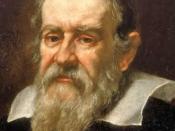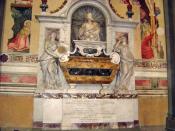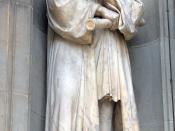Seventeenth-century European study was controlled by two powerful forces: the Roman Catholic Church, headed by the Pope, and ancient philosophy dominated by the 2000-year-old ideas of the Greek philosopher, Aristotle. The Church had an overwhelming influence on the lives of most Europeans. During Galileo's time one in twelve people living in Rome was either a cleric or a nun.1 The Church forbid any teaching that deviated from what was taught in the Bible. To enforce this control, the Church set up the Inquisition. Galileo was targeted by the Inquisition for his observations and experiments. 2 Because his teachings differed from the socially accepted ideas of Aristotle, the Inquisition believed he should be persecuted. Even though Galileo's observations were much more factual than Aristotle's and, more important, backed up by experiments and the use of the telescope, he was still sentenced to house arrest for life.
Galileo Galilei was born on February 15, 1564, in Pisa Italy.3
Galileo was born into a family considered nobility, and his father, Vincenzo Galilei, was an accomplished musician.4 Galileo was tutored privately and also educated by his father until the age of eleven, when his family moved to Florence and sent him to a Jesuit monastery to study medicine.5 Three years after his son began school, Vincenzo was surprised to learn Galileo had decided to become a monk. Somewhat angered, his father withdrew him from the monastery, and Galileo continued his high school education in Florence.
At age seventeen Galileo began college at the University of Pisa, where he reluctantly studied medicine. 6 Throughout his first term attending the university, Galileo became more interested in mathematics than medicine. A court mathematician, by the name of Ostillo Ricci, noticed Galileo in his lectures.7 Impressed with Galileo's knowledge, he urged Galileo change his major to mathematics.


